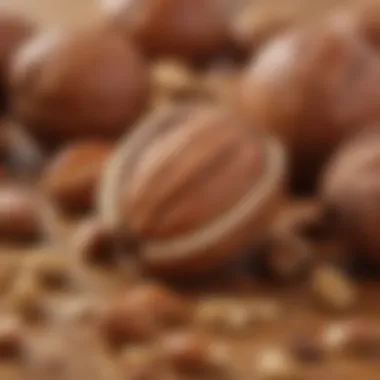Dietary Choices for Naturally Whiter Teeth


Intro
The quest for whiter teeth is a common goal for many people. While numerous cosmetic treatments and products exist, dietary options can significantly influence the color and health of one’s teeth. Certain foods and beverages interact with tooth enamel and dentin in distinct ways, potentially aiding in the reduction of stains. Furthermore, understanding the role of specific nutrients can shed light on how diet impacts dental aesthetics.
This article will examine various dietary choices that may contribute to whiter teeth, highlighting not only beneficial foods but also the biochemical basis for their effectiveness. By integrating practical insights into nutrition throughout one's daily routine, individuals can empower themselves to enhance their smiles.
In the sections ahead, we will explore:
- The key foods that promote oral health
- The impact of various nutrients on enamel and dentin
- Lifestyle choices that can magnify or diminish dietary benefits
- Practical advice for incorporating these dietary recommendations into everyday life
Each facet will be essential in formulating a holistic approach to achieving a naturally brighter smile.
Foreword to Teeth Whitening
The pursuit of a brighter smile has become an important part of personal care for many individuals today. Teeth whitening serves a tangible purpose, not only linked to aesthetics but also to self-esteem and confidence. This section will examine the significance of understanding teeth whitening within the context of dietary options. Through careful exploration, one can grasp the connection between food choices and their potential impact on tooth color.
Understanding Teeth Discoloration
Teeth discoloration occurs due to various factors, both intrinsic and extrinsic in nature. Extrinsic discoloration originates from surface stains, often caused by dietary habits. Beverages such as coffee, tea, and red wine can lead to such staining. In contrast, intrinsic discoloration comes from within the tooth, often due to traumatic incidents, medications, or genetic factors. Both forms of discoloration underscore the necessity for effective whitening approaches.
The Role of Diet in Dental Aesthetics
Diet plays a central role in the maintenance of oral health, influencing not only the condition of gums and teeth but also their appearance. A well-balanced diet rich in certain vitamins and minerals can enhance the integrity of enamel, providing natural defense against discoloration. Foods high in fiber, for example, tend to clean teeth as one chews, assisting in reducing plaque buildup which can contribute to staining.
Moreover, some foods, like dairy products, can be beneficial due to their calcium content, which supports dental structure. Understanding the broader impact of diet on dental aesthetics encourages a proactive approach.
"Diet acts as both a friend and a foe to teeth, shaping their aesthetic potential based on choices made daily."
Nutritional Foundations for Oral Health
Healthy teeth and gums are essential for overall well-being and aesthetics. Nutrition plays a significant role in maintaining oral health. A balanced diet provides the necessary vitamins and minerals that contribute to strong teeth and reduced discoloration. The nutrients consumed not only affect the physical structure of teeth but also influence their appearance. Specific dietary choices can help in achieving a brighter, whiter smile.
Essential Vitamins and Minerals
Vitamin
Vitamin C is crucial for the maintenance of gum health. It supports the production of collagen, which is essential for the structure of gums and connective tissue around teeth. This vitamin is well-known for its immune-boosting properties, but its role in oral health is equally important. A deficiency in Vitamin C can lead to gum problems and increased bleeding. Furthermore, it acts as an antioxidant, helping to combat inflammation in the mouth.
Key characteristic: Its ability to enhance collagen synthesis.
Advantages: Regular intake of Vitamin C-rich foods, such as citrus fruits, helps in maintaining healthier gums. This indirectly supports a brighter smile by promoting overall dental health without any known significant disadvantages.
Calcium
Calcium is fundamentally important for strong teeth. It is one of the primary components of tooth structure, contributing to both enamel hardness and overall dental integrity. Consuming adequate calcium can prevent problems like tooth decay and discoloration. Dairy products, such as milk and cheese, are excellent sources of this mineral.
Key characteristic: It strengthens tooth enamel, making it less susceptible to decay.
Advantages: A diet high in calcium can lead to enhanced dental robustness. However, excessive intake might lead to osteonecrosis or dental issues, but these are generally rare in normal dietary habits.
Phosphorus
Phosphorus is another critical mineral that works synergistically with calcium. It aids in the formation of strong enamel and helps in the remineralization process. This nutrient is vital for maintaining the health of teeth and bones alike. Foods rich in phosphorus include meat, fish, eggs, and nuts.


Key characteristic: It bolsters tooth structure and plays a role in acid-base balance.
Advantages: Optimal phosphorus levels can enhance enamel strength. However, excessive phosphorus paired with low calcium can potentially lead to bone health issues.
Influence of Antioxidants
Anti-inflammatory Properties
Antioxidants protect the body from oxidative stress and inflammation, which can affect the health of gums and teeth. Berries, nuts, and green leafy vegetables are prime sources of antioxidants. They contribute to reduced inflammation in the oral cavity and promote healthier gums.
Key characteristic: Their ability to fight oxidative damage in the body.
Advantages: Incorporating antioxidant-rich foods into the diet can promote healthier gums and prevent issues that may lead to more serious dental problems.
Impact on Enamel Integrity
Antioxidants also play a role in preserving enamel integrity. By mitigating the impact of harmful bacteria and acids, they help to maintain the shiny surface of teeth. Foods rich in vitamins A, C, and E support enamel health through their antioxidant actions.
Key characteristic: Their role in supporting the strength of the enamel.
Advantages: Enhanced enamel durability leads to reduced vulnerability to discoloration. Failure to maintain adequate antioxidant levels may lead to compromised enamel integrity.
Foods to Incorporate for Whiter Teeth
In exploring dietary options for whiter teeth, it is vital to understand the role of certain foods that contribute positively to dental aesthetics. The inclusion of specific ingredients that encourage whitening can result in noticeable improvement over time. Foods rich in nutrients and natural properties can enhance the condition of the teeth. It's essential to approach this aspect of nutrition with the intention of not only achieving a whiter smile but also supporting overall oral health.
Crunchy Fruits and Vegetables
Apples
Apples are often referred to as nature's toothbrush. The crunchiness of their texture provides a natural scrubbing action that can help remove surface stains on teeth. Additionally, apples are high in fiber, which increases saliva production, aiding in the neutralization of acids. This characteristic makes apples beneficial in maintaining healthy enamel. However, the natural sugars present in apples could pose a risk if consumed excessively, as they may cause tooth decay when proper dental hygiene is not followed.
Carrots
Carrots are known for their high beta-carotene content. This vegetable not only supports good vision but can also benefit oral health. Chewing raw carrots stimulates gums, increasing blood circulation and promoting periodontal health. The crunchiness acts similarly to apples, providing a cleaning action. Although carrots have a natural sweetness, their fiber content helps mitigate negative effects on teeth.
Cucumbers
Cucumbers offer hydration and crunch while being low in calories. Their high water content helps wash away food particles and bacteria, aiding in oral cleanliness. The mild effect of cucumbers is gentle on both the teeth and gums. While they don’t specifically whiten teeth directly, their inclusion in regular diets can promote fresher breath and overall dental health. The lack of natural sugars is a definite advantage in limiting potential staining.
Dairy Products and Their Benefits
Cheese
Cheese provides several benefits for oral health, including its ability to neutralize acid. The calcium in cheese supports strong teeth and bones. Eating cheese increases saliva production, which helps rinse away food particles and bacteria. Certain varieties, like aged cheese, are high in calcium phosphate that can strengthen enamel. One disadvantage is that some cheeses can be high in fat, so it is wise to choose low-fat options when possible.
Yogurt
Yogurt contains probiotics that benefit gut health and can also be advantageous for oral health. Its calcium content strengthens bones and promotes enamel health. The creamy texture of yogurt can coat the teeth, providing a protective barrier. However, it is essential to select plain yogurt rather than those with added sugars, which may counteract the positive effects on teeth.
Milk
Milk is another great source of calcium and vitamin D, both crucial for teeth health. The protein casein helps protect teeth by forming a protective film on the enamel. Regular consumption of milk can lead to a lower risk of cavities. However, the lactose in milk can sometimes be a concern for individuals who are lactose intolerant, making alternatives like lactose-free milk necessary for those individuals.


Berries and Their Natural Effects
Strawberries
Strawberries contain malic acid, which acts as a natural exfoliant. This acid helps to remove surface stains and enhances the whiteness of teeth. Additionally, strawberries are rich in vitamin C, supporting overall gum health. One downside is that their acidity can be detrimental if consumed excessively; it is best to consume them in moderation and maintain good dental hygiene afterward.
Raspberries
Raspberries also contain antioxidants and vitamins that promote good oral health. Their high fiber content helps clean the teeth as they are eaten. The natural sugars present in raspberries are mitigated by their water content. However, like strawberries, their high acidity requires careful attention to dental hygiene to prevent enamel erosion.
Herbs and Spices with Whitening Potential
Basil
Basil possesses antibacterial properties that may help reduce bacteria in the mouth. This effect can lead to fresher breath and healthier gums. Adding fresh basil to dishes provides flavor while simultaneously benefiting teeth. The major consideration is that its use is usually in small quantities. Relying on basil as a primary solution for whitening may not yield significant results alone.
Cilantro
Cilantro is known for its strong antibacterial properties. It can neutralize bad breath effectively. Its inclusion in meals, not only enhances flavor but can benefit oral health by decreasing oral bacteria. However, cilantro may not have a significant direct effect on whitening.
In summary, integrating crunch fruits, vegetables, dairy products, berries, and certain herbs into your diet can effectively contribute to achieving whiter teeth. Maintaining a balanced diet alongside consistent dental care is key to enhancing dental aesthetics.
Beverages That Support Oral Health
Beverages play a significant role in maintaining oral health and can greatly influence the whiteness of teeth. While solid food choices often receive more attention, liquids consumed daily contribute to oral aesthetics and overall dental wellness. Specific drinks can help mitigate staining, promote saliva production, and support the integrity of enamel. The selection of beverages can have long-lasting effects on the appearance of your smile, thus it demands careful consideration.
Water: The Essential Hydrator
Water is the most vital beverage for oral health. Drinking enough water daily helps maintain hydration and supports the body's natural functions. It aids in the production of saliva, which naturally cleanses the mouth and neutralizes acids produced by bacteria. Adequate hydration reduces the risk of dry mouth, a condition that can lead to numerous dental problems, including bad breath and enamel erosion.
Additionally, rinsing your mouth with water after consuming foods or drinks can help remove residues that often lead to staining. It is recommended to drink water frequently throughout the day, especially after meals, to help maintain a clean mouth and prevent discoloration of your teeth.
Green Tea and Its Polyphenols
Green tea offers numerous benefits for oral health due to its high concentration of polyphenols. These naturally occurring compounds can inhibit the growth of bacteria that contribute to plaque formation and gum disease. Research indicates that green tea can also reduce the acidity level in the mouth, which is crucial for minimizing enamel erosion. Regular consumption of green tea might help in reducing staining over time, promoting a whiter smile.
The flavor profile of green tea is often appreciated by many. Incorporating it into your daily routine not only enhances your oral health but also provides an appealing alternative to sugary beverages.
Research on Coffee and Teeth Staining
Coffee is a widely consumed beverage, yet it is notorious for its potential to stain teeth. The dark pigmentation and acidity found in coffee can lead to discoloration over time. However, understanding how to enjoy coffee while managing its effects is essential. Some studies suggest that combining coffee with milk can help reduce the staining potential. Milk may react with the polyphenols in coffee, potentially decreasing their likelihood of adhering to tooth enamel.
Moreover, maintaining a rigorous dental hygiene routine after coffee consumption can help minimize staining. Brushing teeth or rinsing mouth after drinking coffee can assist in removing some of the compounds responsible for discoloration. Being mindful of both the quantity consumed and the methods of consumption can mitigate the adverse effects of coffee on dental aesthetics.
Key Takeaway: Choosing the right beverages can significantly influence your teeth's brightness and overall oral health.
Foods to Avoid for Optimal Oral Health
To maintain whiter teeth, understanding foods that can be detrimental to oral health is crucial. The choices we make regarding our diet significantly impact not only the color of our teeth but also the overall condition of our dental health. Certain foods can accelerate staining, weaken enamel, or promote decay. By being informed about these specific foods, one can take proactive measures to protect teeth and enhance their appearance.
Sugary Snacks and Their Consequences
Sugary snacks pose a distinct threat to oral health. When sugar interacts with bacteria in the mouth, it creates acids that attack tooth enamel. Frequent consumption of these snacks can lead to an increase in plaque and a higher risk of cavities. This process can also contribute to discoloration as plaque builds up around stained areas. Understanding this connection between sugar and tooth health is vital for anyone looking to maintain a bright smile. Decreasing intake of sugary treats not only aids in reducing stains but also supports long-term dental hygiene.


Acidic Foods: Caution Required
Acidic foods should be approached with caution. Foods such as citrus fruits, tomatoes, and vinegar can wear down enamel over time. When enamel is compromised, teeth become more susceptible to staining from other foods and beverages. The acid softens the enamel temporarily, which can lead to erosion. This erosion allows pigments from deeply colored foods to penetrate more easily. Limiting intake of acidic foods can help maintain the integrity of teeth and prevent unwelcome discoloration.
Staining Drinks to Limit
When it comes to beverages, certain options can significantly contribute to staining and decay. Understanding the implications of these drinks can help steer individuals toward better choices.
Sodas
Sodas are notorious for their high sugar content and acidity. They not only promote tooth decay but also cause significant staining due to dark pigments, especially in colas. The carbonation creates an acidic environment that weakens tooth enamel over time. Therefore, regular consumption of sodas leads not just to cavities but also to increased risk of staining from other dietary sources. It is advisable to limit sodas to protect enamel and prevent discoloration.
Red Wine
Red wine is well-known for its rich pigments that can lead to staining. The tannins present in red wine also contribute to the likelihood of stains adhering to teeth. Even moderate consumption can affect the brightness of one’s smile. While red wine has potential health benefits, its impact on dental aesthetics cannot be overlooked. Controlling its intake can be beneficial for maintaining whiter teeth. Understanding this balance is key to enjoying red wine while still prioritizing oral health.
"Awareness of what foods and beverages stain teeth can empower individuals to make informed choices for optimal oral health."
By avoiding or limiting the intake of sugary snacks, acidic foods, and staining drinks like sodas and red wine, individuals can better protect their teeth from discoloration. This focus on diet complements the broader strategy for oral health, and with the right choices, it is possible to maintain a balance between enjoying various foods and keeping teeth looking their best.
Overall Lifestyle Considerations
Dietary choices are only one piece of the puzzle in achieving whiter teeth. Overall lifestyle considerations are crucial to maintaining oral health and enhancing the impact of dietary efforts. This section will detail key aspects such as hydration and regular dental care, emphasizing their benefits and necessary practices.
The Importance of Hydration
Hydration plays a fundamental role in oral health. Drinking enough water helps to wash away food particles and bacteria, reducing the risk of plaque buildup. Saliva production is essential for maintaining a neutral pH in the mouth and protecting enamel from acid erosion. Water also aids in the remineralization of tooth enamel, which can strengthen and protect against discoloration.
Furthermore, staying hydrated can reduce the likelihood of dry mouth. A dry mouth increases the chances of oral health issues, including bad breath and tooth decay. Therefore, regular water consumption is a simple yet effective strategy for achieving a brighter smile.
Regular Dental Care Practices
Regular dental care practices cannot be overlooked. Brushing teeth at least twice a day with fluoride toothpaste is vital. This removes plaque and food debris that can lead to staining. Flossing daily helps to clean between teeth where brushes may not reach, ensuring a comprehensive clean.
Additionally, professional dental cleanings are important. Visiting a dentist every six months allows for thorough cleaning and examination. Dentists can identify potential issues early on and offer treatments that may help with whitening and overall oral health.
Incorporating mouthwash into daily routines can offer added protection. An antimicrobial mouthwash can help reduce plaque and gingivitis, contributing to healthier gums and teeth. Overall, a commitment to these dental care practices enhances the effectiveness of dietary choices aimed at teeth whitening.
Finale and Final Thoughts
Implementing dietary changes is not merely about selecting certain foods but also involves understanding the biochemical interactions that occur in the mouth. Nutrients such as vitamins, minerals, and antioxidants play a pivotal role in maintaining enamel integrity and minimizing discoloration. A balanced diet that incorporates crunchy fruits, dairy products, and a variety of herbs can contribute significantly to this goal.
Besides diet, it is important to recognize the influence of lifestyle practices on oral health. Hydration, regular brushing, and dental check-ups complement any dietary approach aimed at improving teeth appearance.
Overall, a holistic approach that combines dietary strategies with diligent oral care presents the best chance for achieving and maintaining whiter teeth.
Recap of Key Dietary Insights
The discussion on dietary choices for whiter teeth emphasizes several key insights:
- Incorporation of Crunchy Fruits and Vegetables: Foods like apples and carrots help in mechanically cleaning teeth due to their fibrous nature while providing essential nutrients.
- Benefits of Dairy Products: Cheese and yogurt contain calcium and phosphates that strengthen enamel, reducing the risk of stains.
- Antioxidants in Berries: Strawberries offer natural whitening properties due to their malic acid content.
- Health Impacts of Herbs: Herbs like basil can possess antibacterial properties, further aiding in dental health.
These dietary insights underline the potential for utilizing food as a natural ally in the journey towards achieving whiter teeth.
Future Directions in Oral Health Research
Future research in the field of oral health should focus on understanding the biochemical pathways through which food components interact with enamel and dentin. There is potential for discovering novel compounds in everyday foods that may enhance their whitening properties. Additionally, exploring the link between gut health and oral health could unveil new dietary recommendations that benefit both areas.
Further studies could also assess the long-term effectiveness of specific diets on teeth discoloration. Comprehensive investigations involving a diverse population could lead to tailored dietary guidelines aimed at improving dental aesthetics based on individual needs.
Ultimately, ongoing advancements in dental research can provide deeper insights and effective strategies for maintaining not just whiter teeth, but also enhanced oral health.







